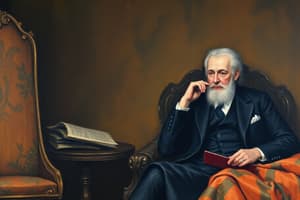Podcast
Questions and Answers
What was B.F. Skinner's primary belief regarding the potential of behaviorism?
What was B.F. Skinner's primary belief regarding the potential of behaviorism?
- It held the secret to controlling every aspect of human life in a perfectly structured society.
- It could offer limited insights into understanding complex human emotions but wasn't applicable as a widespread solution.
- A scientific understanding of behavioral principles could be applied to improve social welfare. (correct)
- It was a dangerous tool that, if misused, would lead to authoritarian control and the suppression of individual freedom.
Which statement best encapsulates the core argument presented in Skinner's books, Walden II and Beyond Freedom and Dignity?
Which statement best encapsulates the core argument presented in Skinner's books, Walden II and Beyond Freedom and Dignity?
- Utopian societies can only be achieved through strict governmental control and the suppression of individual expression.
- Free will is an illusion; behavior is determined by consequences and reinforcement, which can be used to address social problems. (correct)
- Individuals should strive to overcome their conditioned responses to achieve true autonomy and self-determination.
- Traditional educational systems are fundamentally flawed and should be replaced with behaviorist models based on rewards and punishments.
How did Skinner apply the principle of reinforcement in his vision of a utopian society?
How did Skinner apply the principle of reinforcement in his vision of a utopian society?
- By suggesting the principle of reinforcement should be used to control all human behavior in a judicious manner. (correct)
- By advocating for a system in which punishments were minimized and all citizens had absolute freedom.
- By proposing that reinforcement be used to encourage competition and innovation in the workplace.
- By promoting the establishment of a rigid social hierarchy where only certain individuals received rewards.
What was a common criticism of Skinner's ideas, as reflected in the media and among reviewers?
What was a common criticism of Skinner's ideas, as reflected in the media and among reviewers?
How did Skinner believe humans could control their destiny, according to his behavioristic view?
How did Skinner believe humans could control their destiny, according to his behavioristic view?
Which of the following best describes the central idea behind Freud's psychoanalytic theory regarding the unconscious?
Which of the following best describes the central idea behind Freud's psychoanalytic theory regarding the unconscious?
How did Charcot and Janet's work with hysteria contribute to the development of psychological thought in the early 1900s?
How did Charcot and Janet's work with hysteria contribute to the development of psychological thought in the early 1900s?
What distinguished Freud's approach to treating patients with 'nervous disorders' from traditional medical practices of his time?
What distinguished Freud's approach to treating patients with 'nervous disorders' from traditional medical practices of his time?
In the context of the early 1900s, how did the growing understanding of hysteria challenge existing scientific perspectives on the human body and mind?
In the context of the early 1900s, how did the growing understanding of hysteria challenge existing scientific perspectives on the human body and mind?
Why were the theories of figures like Freud significant in bringing psychology to the 'public stage' during the early 1900s?
Why were the theories of figures like Freud significant in bringing psychology to the 'public stage' during the early 1900s?
Jean-Martin Charcot and Pierre Janet's investigations centered around understanding hysteria. What key methodology made their work groundbreaking?
Jean-Martin Charcot and Pierre Janet's investigations centered around understanding hysteria. What key methodology made their work groundbreaking?
Given the context of early psychological exploration, how might Freud's prior research on cocaine have influenced his later theories about the unconscious mind?
Given the context of early psychological exploration, how might Freud's prior research on cocaine have influenced his later theories about the unconscious mind?
How did the emergence of psychoanalysis and behaviorism as distinct schools of thought MOST impact the field of psychology in the early 20th century?
How did the emergence of psychoanalysis and behaviorism as distinct schools of thought MOST impact the field of psychology in the early 20th century?
What key concept, demonstrated by Pavlov's experiments with dogs, did Watson utilize in developing his behaviorist approach?
What key concept, demonstrated by Pavlov's experiments with dogs, did Watson utilize in developing his behaviorist approach?
According to Watson, what should be the primary focus of psychological study?
According to Watson, what should be the primary focus of psychological study?
What did Skinner believe was missing from the stimulus-response psychology of Pavlov and Watson?
What did Skinner believe was missing from the stimulus-response psychology of Pavlov and Watson?
How did Skinner's experiments with rats in Skinner boxes differ from Pavlov's experiments with dogs?
How did Skinner's experiments with rats in Skinner boxes differ from Pavlov's experiments with dogs?
What is the principle of reinforcement, as defined by Skinner?
What is the principle of reinforcement, as defined by Skinner?
What was the main difference between Watson's behaviorism and Skinner's radical behaviorism?
What was the main difference between Watson's behaviorism and Skinner's radical behaviorism?
What happened to other schools of thought when behaviorism rose to prominence?
What happened to other schools of thought when behaviorism rose to prominence?
What was the purpose of the cumulative recorder in Skinner's experiments?
What was the purpose of the cumulative recorder in Skinner's experiments?
Which statement reflects Skinner's view on solving human problems?
Which statement reflects Skinner's view on solving human problems?
What initial career aspiration did Skinner abandon after being captivated by the works of Pavlov and Watson?
What initial career aspiration did Skinner abandon after being captivated by the works of Pavlov and Watson?
Why did Watson exclude terms like "consciousness," "sensation," and "will" from his discussions of psychology?
Why did Watson exclude terms like "consciousness," "sensation," and "will" from his discussions of psychology?
How did Skinner's principle of reinforcement extend beyond simple behaviors?
How did Skinner's principle of reinforcement extend beyond simple behaviors?
What did Skinner's experiments with rats demonstrate about how animals learn?
What did Skinner's experiments with rats demonstrate about how animals learn?
Why was Watson's perspective considered revolutionary in the field of psychology?
Why was Watson's perspective considered revolutionary in the field of psychology?
Which university did Skinner attend to study psychology?
Which university did Skinner attend to study psychology?
According to Freud, what is the primary method for accessing and understanding the unconscious mind?
According to Freud, what is the primary method for accessing and understanding the unconscious mind?
Why did experimental psychologists, like William James, show limited interest in Freud's psychoanalytic theories?
Why did experimental psychologists, like William James, show limited interest in Freud's psychoanalytic theories?
What is the central tenet of behaviorism as proposed by John B. Watson?
What is the central tenet of behaviorism as proposed by John B. Watson?
How did Ivan Pavlov's research on dogs influence the development of behaviorism?
How did Ivan Pavlov's research on dogs influence the development of behaviorism?
What did Freud believe was contained within the unconscious mind?
What did Freud believe was contained within the unconscious mind?
Which best describes the role of free association in Freudian psychoanalysis?
Which best describes the role of free association in Freudian psychoanalysis?
What event significantly altered John B. Watson's career, leading him to transition from academia to advertising?
What event significantly altered John B. Watson's career, leading him to transition from academia to advertising?
Which of the following is a key difference between the psychoanalytic approach and the behaviorist approach in psychology?
Which of the following is a key difference between the psychoanalytic approach and the behaviorist approach in psychology?
What was the initial reception of Sigmund Freud's book, The Interpretation of Dreams?
What was the initial reception of Sigmund Freud's book, The Interpretation of Dreams?
Imagine a patient undergoing psychoanalysis. Which of the following scenarios aligns with Freud's therapeutic approach?
Imagine a patient undergoing psychoanalysis. Which of the following scenarios aligns with Freud's therapeutic approach?
Considering Watson's perspective, which research method would he most likely favor in studying human behavior?
Considering Watson's perspective, which research method would he most likely favor in studying human behavior?
If Freud and Watson were to collaborate on understanding a patient's anxiety, how would their approaches likely differ?
If Freud and Watson were to collaborate on understanding a patient's anxiety, how would their approaches likely differ?
Freud might argue that a person's fear of spiders stems from a repressed traumatic experience, while a behaviorist would argue it is due to:
Freud might argue that a person's fear of spiders stems from a repressed traumatic experience, while a behaviorist would argue it is due to:
Imagine a dog salivates at the sight of a food bowl. According to Pavlov's findings, what type of stimulus is the food bowl after the dog has been conditioned?
Imagine a dog salivates at the sight of a food bowl. According to Pavlov's findings, what type of stimulus is the food bowl after the dog has been conditioned?
What advertising techniques might John B. Watson have employed, given his behaviorist perspective?
What advertising techniques might John B. Watson have employed, given his behaviorist perspective?
Flashcards
Psychoanalysis
Psychoanalysis
A psychological approach that emphasizes the influence of unconscious thoughts, feelings, and memories on behavior.
Sigmund Freud
Sigmund Freud
A physician who founded psychoanalysis.
Unconscious
Unconscious
The part of the mind containing information of which people are not aware.
Hysteria
Hysteria
Signup and view all the flashcards
Behaviorism
Behaviorism
Signup and view all the flashcards
Reinforcement
Reinforcement
Signup and view all the flashcards
Charcot and Janet
Charcot and Janet
Signup and view all the flashcards
Freud's Early Career
Freud's Early Career
Signup and view all the flashcards
Behaviorism (Skinner)
Behaviorism (Skinner)
Signup and view all the flashcards
Skinner's view on Free Will
Skinner's view on Free Will
Signup and view all the flashcards
Principle of Reinforcement
Principle of Reinforcement
Signup and view all the flashcards
Walden Two
Walden Two
Signup and view all the flashcards
Beyond Freedom and Dignity
Beyond Freedom and Dignity
Signup and view all the flashcards
Psychoanalytic Theory
Psychoanalytic Theory
Signup and view all the flashcards
Free Association
Free Association
Signup and view all the flashcards
John B. Watson
John B. Watson
Signup and view all the flashcards
Pavlov's Observation
Pavlov's Observation
Signup and view all the flashcards
Associative Learning
Associative Learning
Signup and view all the flashcards
Ivan Pavlov
Ivan Pavlov
Signup and view all the flashcards
Unconditioned Stimulus
Unconditioned Stimulus
Signup and view all the flashcards
Conditioned Stimulus
Conditioned Stimulus
Signup and view all the flashcards
Unconditioned Response
Unconditioned Response
Signup and view all the flashcards
Conditioned Response
Conditioned Response
Signup and view all the flashcards
Acquisition
Acquisition
Signup and view all the flashcards
Classical Conditioning
Classical Conditioning
Signup and view all the flashcards
Response (in Behaviorism)
Response (in Behaviorism)
Signup and view all the flashcards
Watson's Behaviorism
Watson's Behaviorism
Signup and view all the flashcards
Skinner
Skinner
Signup and view all the flashcards
Skinner Box
Skinner Box
Signup and view all the flashcards
Cumulative Recorder
Cumulative Recorder
Signup and view all the flashcards
Stimulus
Stimulus
Signup and view all the flashcards
Pavlov
Pavlov
Signup and view all the flashcards
Operant Conditioning
Operant Conditioning
Signup and view all the flashcards
Radical Behaviorism
Radical Behaviorism
Signup and view all the flashcards
Stimulus-Response Psychology
Stimulus-Response Psychology
Signup and view all the flashcards
Study Notes
Psychoanalysis
- Sigmund Freud, a Viennese physician, developed psychoanalytic theory.
- Psychoanalytic theory emphasizes the influence of the unconscious mind on feelings, thoughts, and behaviors.
- Freud thought painful childhood memories were hidden in the unconscious.
- Freud believed that the mind is a set of processes hidden from view.
- Freud considered conscious thoughts as surface-level compared to the vast unconscious.
- Psychoanalysis aims to give people insight into the contents of their unconscious minds.
- Freud used dream analysis and free association to access the unconscious mind.
- William James admired some of Freud’s insights but regarded most of his theories as nonsense.
- Despite initial skepticism from experimental psychologists, Freud's psychoanalytic movement gained followers like Carl Jung and Alfred Adler.
- Freud’s thinking significantly influenced the 20th century such as history, philosophy, literature, art, and popular culture.
Behaviorism
- John Broadus Watson, founded behaviorism.
- Behaviorism restricts scientific inquiry to observable behavior, rather than internal mental processes.
- Watson was inspired by Ivan Pavlov's work on stimulus and response.
- Pavlov's experiments with dogs showed that they could be conditioned to salivate at a tone.
- Watson argued psychology should study the relationship between stimuli and responses.
- Watson's behaviorist approach became dominant in experimental psychology by the 1930s.
Skinner
- Burrhus Frederick Skinner was captivated by the work of Pavlov and Watson.
- Skinner believed that stimulus-response psychology was missing something important.
- Skinner created the "Skinner Box" to study animal behavior through controlled experiments.
- The Skinner Box had a lever that dispensed food when pressed, enabling the study of operant conditioning.
- The cumulative recorder tracked the frequency of lever presses in real-time.
- Skinner rats learned to operate on their environments to produce food.
- The principle of reinforcement states that rewarded behaviors are repeated, and unrewarded behaviors are not.
- Skinner believed that the principle of reinforcement could explain complex human behaviors.
- By the 1940s, radical behaviorism dominated psychology.
- Skinner’s theories influenced classroom education, government programs, psychological therapies, and child-rearing practices.
- Skinner wrote "Walden II" (1948) and "Beyond Freedom and Dignity" (1971), proposing a utopian society controlled by reinforcement.
- Skinner claimed free will was an illusion.
- Critics accused Skinner of advocating for control and loss of freedom, however, he aimed to improve social welfare through a scientific understanding of behavior.
Studying That Suits You
Use AI to generate personalized quizzes and flashcards to suit your learning preferences.
Description
Explore Sigmund Freud's psychoanalytic theory, emphasizing the unconscious mind's influence on thoughts and behaviors. Learn about dream analysis, free association, and the impact of Freud's ideas on 20th-century thought. Understand the basics of psychoanalysis.




